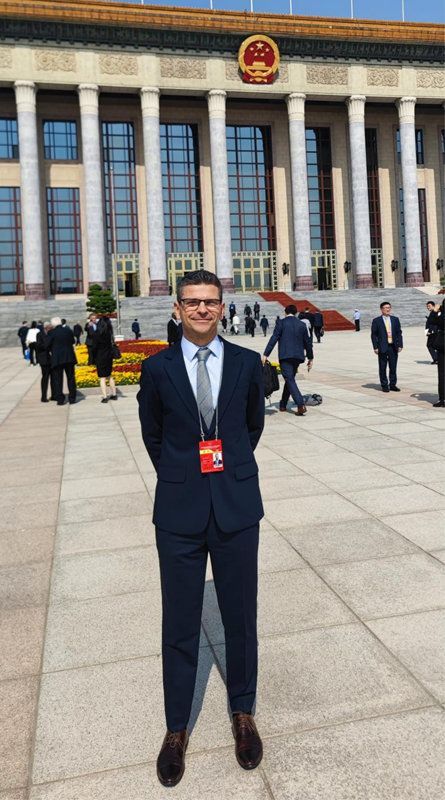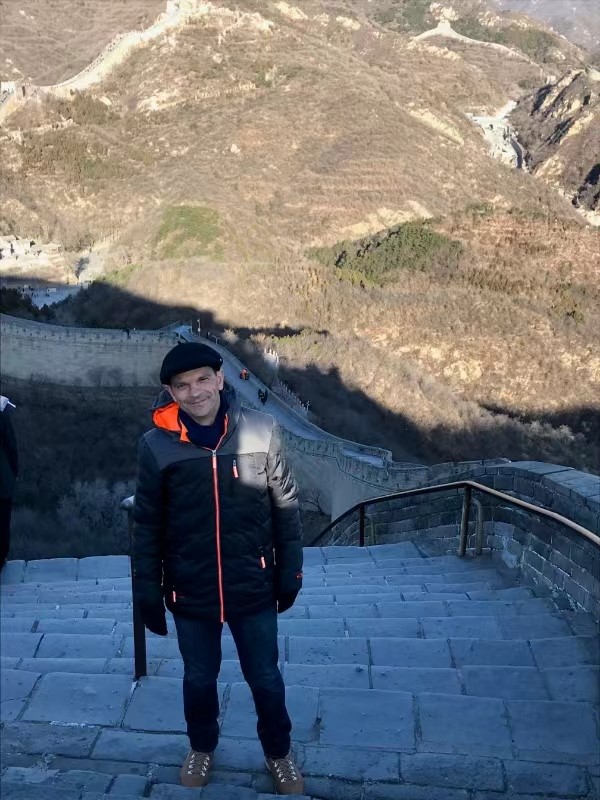The river of friendship, sometimes calm and serene, sometimes turbulent and tumultuous, continues to flow without stopping, just like the enduring friendship between the people of Latin America and China.

Diego Marocos participates in the Conference Marking the 70th Anniversary of the Five Principles of Peaceful Coexistence in Beijing, 2024. (Photo provided by Diego Marcos)
I come from Argentina. Since my first visit to China over 20 years ago, I have been to this country 33 times. The friendships I have established with the Chinese people often touch the deepest part of my heart. I have learned a lot from them and gained many insights.
In China, I am always inspired by the passion for innovation.
Despite having visited China so many times, I never felt like I truly understood the country. As China maintains steady economic growth, I am always struck by the exciting progress in Chinese society every time I go to this country, particularly the rapid development of mobile payment. Whenever I visited Beijing, I always booked a hotel near Wangfujing Street, which boasts a wide range of shopping, dining, cultural and entertainment facilities as well as easy access to transportation.
I particularly enjoy wandering through a supermarket by the street, where the shelves are filled with a wide array of products, offering everything one could possibly need. I always picked out gifts for my family and friends from the supermarket.
Back then, I always used cash for transactions as credit card payments were not common in China, but over time, credit cards started to gain popularity across the country. And now, digital payments have quickly become the major payment method in China. I was once amazed when I saw an elderly lady in front of me using a mobile phone for payment at the supermarket.
In my view, digital payment demonstrates how the Chinese people are embracing technological innovation to improve their standard of living. In addition to digital payment, China has been actively promoting reforms in multiple sectors, and more Chinese people are welcoming innovation and using technological achievements to enrich their lives.
I am deeply impressed and inspired by the vibrant innovation ecosystem in China, and I find great pleasure in exploring the new changes happening here. I believe that China will continue to amaze the world with more unexpected developments in the years to come. I learned from the Chinese people that conservative traditions and rapidly changing environments may coexist and may be presented to us as a huge opportunity to evolve and transform ourselves as nothing is truly essentially permanent.

Diego Marcos visits the Badaling Great Wall in Beijing. (Photo provided by Diego Marcos)
In China, I often experience the inclusiveness of "harmony in diversity."
While visiting the Leshan Giant Buddha in southwest China's Sichuan Province, I discussed with a Chinese man the ancient Chinese philosophical concept of Yin and Yang. Previously, I had only understood Yin and Yang as opposing sides in all things, but his explanation opened my eyes. He said that Yin and Yang are not just opposites but mutually transformative and that Chinese people value the complementary relationship between the two.
This sparked thoughts in my mind: Yin and Yang are not fixed but rather interconnected ideas that can change and influence one another. If individuals from distinct civilizations adopt a broader perspective and view each other impartially with a holistic approach, they might recognize the complementarity and shared characteristics between different civilizations.
This led me to think that people from different countries have different perspectives and ways of perceiving things due to their cultural differences. If adopting a more open-minded approach, objectively viewing these differences, treating each other as equals, and listening to one another, perhaps they can gain more inspiration from each other and find ways for different countries, ethnicities, and religious followers to coexist peacefully and harmoniously.
The only certainty we have is that if we deal with differences, imperfection and uncertainty, trust in each other and pursue a common goal of prosperity and wellbeing, things are going to go better. As nothing is truly perfect in essence, it is just our human interaction that helps us to succeed.
In China, I have deeply experienced the power of communication and mutual learning.
I once visited Xizang Autonomous Region in China. Before that, I thought Lhasa was a pure yet closed-off place. However, upon landing, what I saw and heard was completely different from the picture I had in mind.
I encountered a young monk dressed in a red robe, sitting there to check information on his mobile phone, just like many young people in other countries around the world. It was later revealed to me that modern communications devices and technology had been widely available in this remote area many years ago. Xizang is running on the path of modernization like other parts of China.
In Chinese, there is an idiom called "bing shan yi jiao," or "tip of an iceberg," which refers to only a small part of something being exposed. This is scientifically supported, as the density of ice is lower than that of seawater, so the volume of an iceberg above the water surface is often only about 10 percent of its total volume.
People's understanding of things often remains on the surface. Through my experiences and observations in China, I have learned to be humble and calm. When encountering unfamiliar individuals or situations, I refrain from making hasty judgments and instead observe more closely and seek multiple perspectives to deepen my understanding. By releasing preconceptions and biases and trying to see things from the perspective of others, we can rise above cultural differences and enhance our mutual understanding. I learned in China that if we embrace diversity from our hearts, there will be no fear, and a peaceful environment will emerge.
My story with China will continue. I hope to make more contact, communication, and exchanges with Chinese people and gain more inspiration through the collision and exchange of ideas so as to contribute to mutual learning and understanding among different civilizations. If I am right about friendship that flows like a river, it is equally true that we all should navigate together.
(Diego Marcos is the head of Asociación Civíl para la Cooperación Argentino-China)
